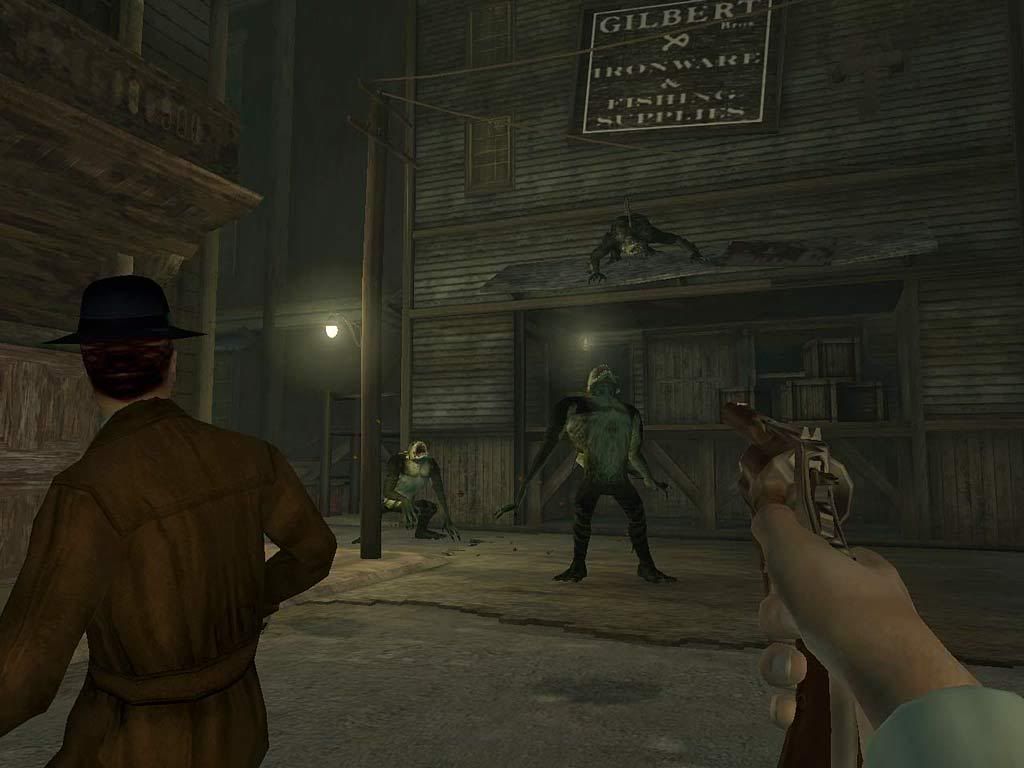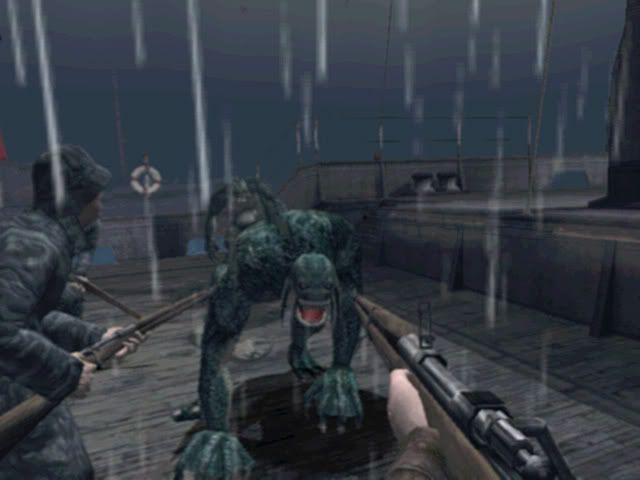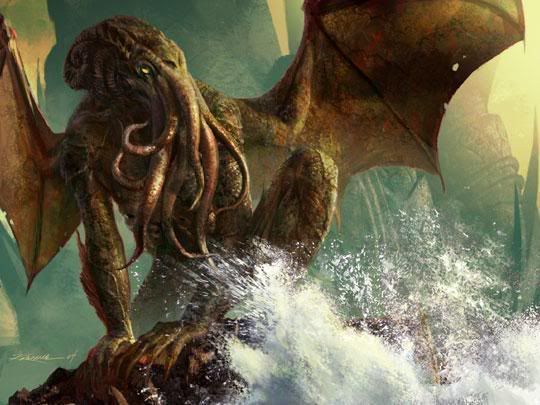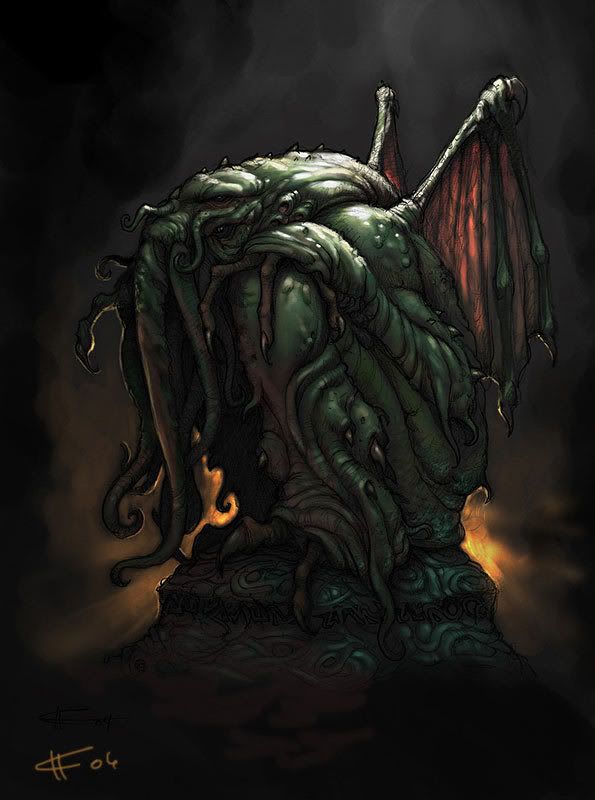XHitoshuraX
Banned
Call of Cthulhu: Dark Corners of the Earth

As a preface for reading This post, please have this playing in the background.
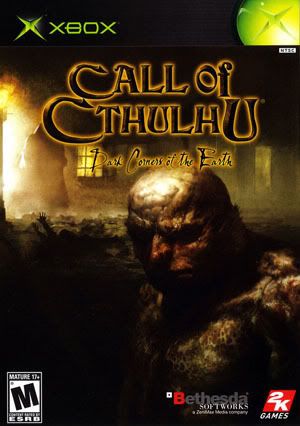
Published by: Bethesda Softworks / 2K Games
Developed by: Headfirst Productions
Genre: First-Person Adventure
Number of Players: 1
Release Date:
US: October 24, 2005
MSRP: $39.99
ESRB Content Descriptors: Blood and Gore, Intense Violence, Strong Language, Use of Drugs and Alcohol
Also Available On: PC

Introduction
Call of Cthulhu -- Dark Corners of the Earth is a first-person horror game that combines intense action and adventure elements. You will draw upon your skills in exploration, investigation, and combat while faced with the seemingly impossible task of battling evil incarnate.
Other than fighting, you have the ability to interact freely with characters and the gaming environment. To increase the sense of immersion, there is no interface or 'HUD' on screen at any time during normal gameplay. Instead, more intuitive methods are available for you to assess your condition, ammunition levels, and other relevant information. The combat within the game is extremely realistic, with a detailed damage and healing system that breaks down the healing process into conditions and treatments - rather than having the typical FPS 'health packs' lying around everywhere.
The game also allows you to stamp your own style onto the proceedings via an advanced AI system that can react to your method of play. Cthulhu enemies can roam freely around the environment - opening doors and tracking you down single-handedly or in groups. To stay alive you won't just be able to outshoot them, you'll need to outthink them as well.
You will have to keep your mental health in check as you are exposed to the increasingly shocking images of the Cthulhu Mythos. You will need to combat enemies using the environment, powerful and evil artifacts, Alien technology, or by fighting with weapons that are completely authentic for the period.
Set during the 1920s, Call of Cthulhu is based on the Cthulhu Mythos of HP Lovecraft, an American writer of fantasy and horror. Lovecraft's stories tell of unthinkable evil, psychic possession, and mythical worlds and his work has profoundly influenced numerous fantasy and science fiction writers, including Stephen King and Anne Rice.
The technology powering Call of Cthulhu has provided Headfirst with the means to present an incredibly detailed and accurate depiction of the sights and sounds of this unique 1920's New England setting. A diverse range of cutting edge special effects is utilized to ensure both unprecedented levels of realism and an exact portrayal of your mental degredation.
Key Features:
Diverse array of levels from quaint towns to alien locations, including Deep One City
Dynamic Sanity system resulting in hallucinations, panic attacks, vertigo, paranoia, and more!
Incredibly detailed real-time graphics with atmospheric lighting and dynamic shadows
Intelligent gameplay involving puzzle solving as well as combat and exploration
1920s weaponry and vehicles as well as evil artifacts and alien technology
Lovecraft's famous monsters and locations
H.P. Lovecraft
Howard Phillips Lovecraft (August 20, 1890 March 15, 1937), of Providence, Rhode Island, was an American author of fantasy, horror and science fiction.
Lovecraft's major inspiration and invention was cosmic horror: life is incomprehensible to human minds and the universe is fundamentally alien. Those who genuinely "reason", like his protagonists, gamble with sanity. Lovecraft has become a cult figure for his Cthulhu Mythos, a series of loosely interconnected fictions featuring a pantheon of human-invalidating entities, as well as the famed Necronomicon, a grimoire of magical rites and forbidden lore. His works were deeply pessimistic; myths directly assaulting Enlightenment, Romanticism and Christianity.
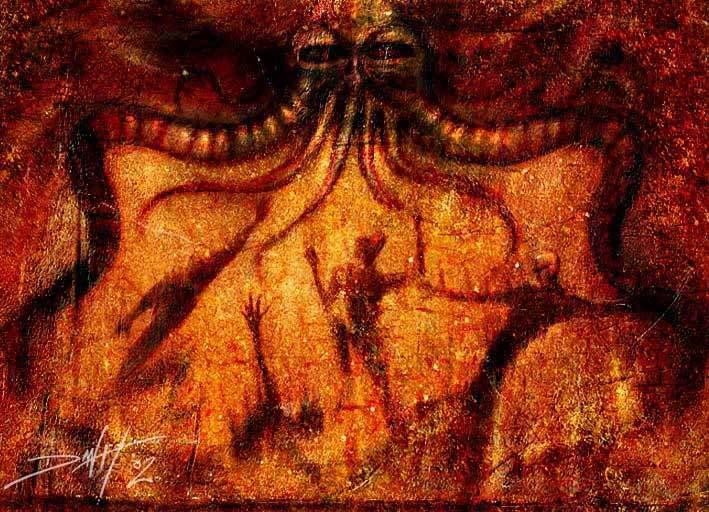
H. P. Lovecrafts name is synonymous with horror fiction; his writing, particularly the Cthulhu Mythos, has influenced fiction authors worldwide, and Lovecraftian elements may be found in novels, movies, music, comic books and cartoons. For example, the insane villains of Gotham City in the Batman stories are said to be incarcerated at Arkham Asylum - Arkham being an invention of Lovecrafts. Many modern horror writers such as Stephen King, Bentley Little, Joe R. Lansdale, to name just a few have cited Lovecraft as one of their primary influences.
Lovecraft's fiction has been grouped into three categories by some critics. While Lovecraft did not refer to these categories himself, he did once write, "There are my 'Poe' pieces and my 'Dunsany pieces' but alas where are my Lovecraft pieces?"[5]
Macabre stories (approximately 19051920)
Dream Cycle stories (approximately 19201927)
Cthulhu Mythos/Lovecraft Mythos stories (approximately 19251935)
Some critics see little difference between the Dream Cycle and the Mythos, often pointing to the recurring Necronomicon and subsequent "gods". A frequently given explanation is that the Dream Cycle belongs more to the genre of fantasy, while the Mythos is science fiction. Also, much of the supernatural elements in the Dream Cycle takes place in its own sphere or mythological dimension separated from our own level of existence. The Mythos on the other hand, is placed within the same reality and cosmos as the humans live in.
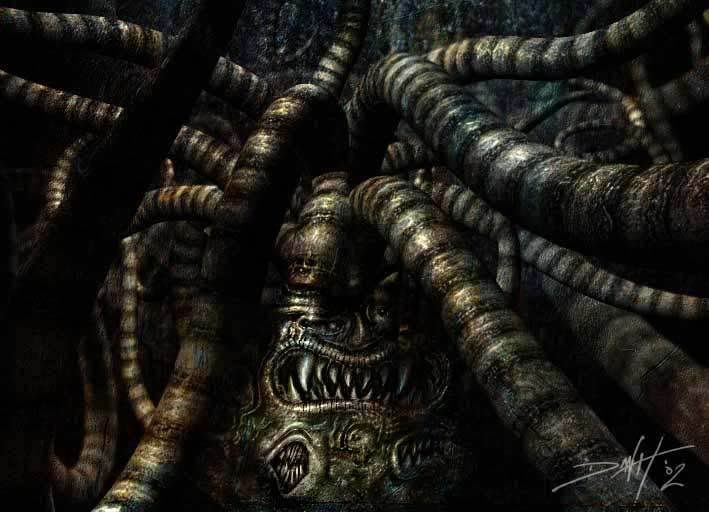
Much of Lovecraft's work was directly inspired by his nightmares, and it is perhaps this direct insight into the unconscious and its symbolism that helps to account for their continuing resonance and popularity.
All these interests naturally led to his deep affection for the works of Edgar Allan Poe, who heavily influenced his earliest macabre stories and writing style known for its creepy atmosphere and lurking fears.
Cthulhu Mythos
The Cthulhu Mythos encompasses the shared elements, characters, settings, and themes found in the works of H. P. Lovecraft and associated horror fiction writers. Together, they form the mythos that authors writing in the Lovecraftian milieu have usedand continue to useto craft their stories. The term itself was coined by the writer August Derleth. Although this legendarium is also sometimes called the Lovecraft Mythos, most notably by the Lovecraft scholar S. T. Joshi it has long since moved beyond Lovecraft's original conception.
Robert M. Price, in his essay "H. P. Lovecraft and the Cthulhu Mythos", sees two stages in the development of the Cthulhu Mythos. The first stage, or "Cthulhu Mythos proper" as Price calls it, took shape during Lovecraft's lifetime and was subject to his guidance. The second stage occurred under August Derleth who attempted to categorize and expand the Mythos after Lovecraft's death.
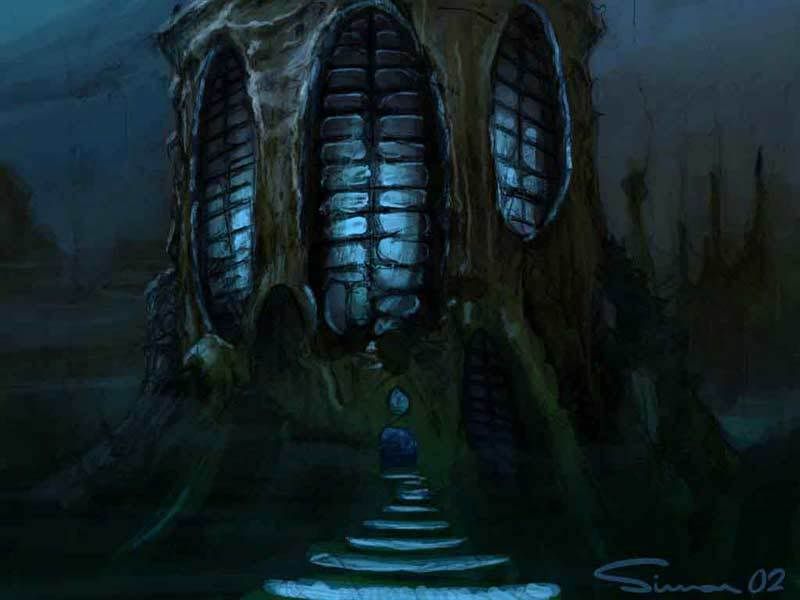
The essence in the Mythos is that the human world and our role in it are an illusion. Humanity is simply living in a fragile bubble, unaware of what lies behind the curtains or even of the curtains themselves, and our seeming dominance over the world is illusory and ephemeral. We are blessed in that we do not realize what lies dormant in the unknown lurking places on Earth and beyond. As Lovecraft famously begins his short story, The Call of Cthulhu, "The most merciful thing in the world, I think, is the inability of the human mind to correlate all its contents."
Now and then, individuals can, by accident or carelessness, catch a glimpse of, or even confront the ancient extraterrestrial entities which the mythology centres around, usually with fatal consequences. Other times, they are represented by their non-human worshippers, whose existence shatters the worldview of those who stumble across them. Human followers exist as well. Because of the limitations of the human mind, these deities appear as so overwhelming that they can often drive a person insane. They are portrayed as neither good or evil; within the Mythos these are concepts invented by our species as a way to explain inexplicable intentions and actions.
The Call of Cthulhu was the premiere story in which Lovecraft realized and made full use of these themes, which is why his mythology would later be named after the creature in this story, as it defined a new direction in both his authorship and in the horror fiction genre. This is also the first and only story by Lovecraft where humans and one of the cosmic entities called the Great Old Ones comes face to face.
Most of the elements of Lovecraft's Mythos were not a cross-pollination of the various story-cycles of the Lovecraft Circle, but were instead deliberately created by each writer to become part of the Mythos the most notable example being the various arcane grimoires of forbidden lore. So, for example, Robert E. Howard has his character Friedrich Von Junzt reading Lovecraft's Necronomicon in "The Children of the Night" (1931), and Lovecraft in turn mentions Howard's Unaussprechlichen Kulten in both "Out of the Aeons" (1935) and "The Shadow Out of Time (1936). Howard frequently corresponded with H. P. Lovecraft, and the two would sometimes insert references or elements of each others' settings in their works. Later editors reworked many of the original Conan stories by Howard; thus, diluting this connection. Nevertheless, many of Howard's unedited Conan stories are arguably part of the Cthulhu Mythos.
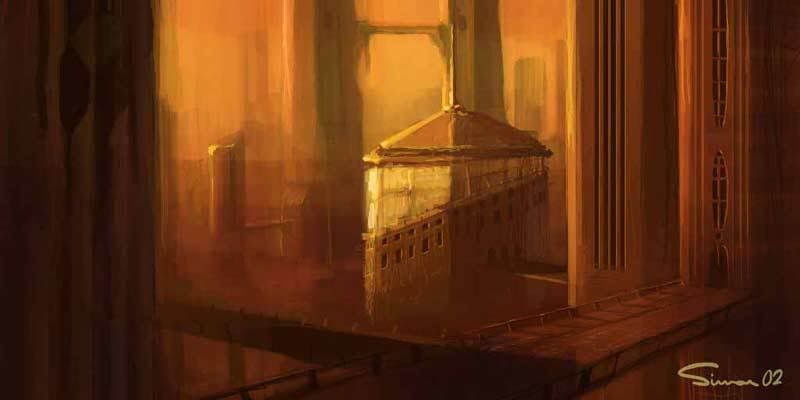
The Mythos usually takes place in fictional New England towns and is centered on the Great Old Ones, a fearsome assortment of ancient, powerful deities who came from outer space and once ruled the Earth. They are presently quiescent, having fallen into a death-like sleep at some time in the distant past. The most well-known of these beings is Cthulhu, who currently lies "dead [but] dreaming" in the submerged city of R'lyeh somewhere in the Southeast Pacific Ocean. One day, "when the stars are right", R'lyeh will rise from beneath the sea, and Cthulhu will awaken and wreak havoc on the earth.
Despite his notoriety, Cthulhu is not the most powerful of the deities, nor is he the theological center of the mythos. Instead, this position is held by the demon-god Azathoth, an Outer God, ruling from his cosmically centered court. Nonetheless, Nyarlathotep, who fulfills Azathoth's random urges, has intervened more frequently and more directly in human affairs than any other Outer god. He has also displayed more blatant contempt for humanity, especially his own worshippers, than almost any other Lovecraftian deity.
Gameplay
The game is notable for featuring no HUD - instead of an overlaid health meter, the character's condition is relayed through the sound cues of his heartbeat and breathing, which become more pronounced when wounded.
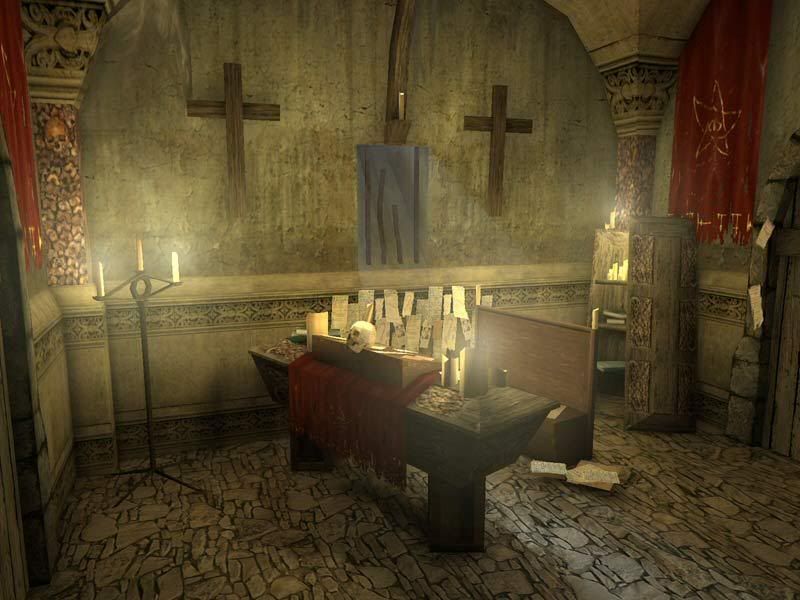
The character loses sanity when he looks directly at upsetting aspects of the game world, such as mutilated bodies or precipitous drops. Sanity loss can lead to hallucinations and visions, which manifest as graphical anomalies, sound distortion and changes in control sensitivity. If the character is sufficiently disturbed, permanent insanity or suicide will result and the game will end. The game's health system is more realistic than other games of its genre, in that different forms of injury will require different remedies, such as a splint for a broken leg.
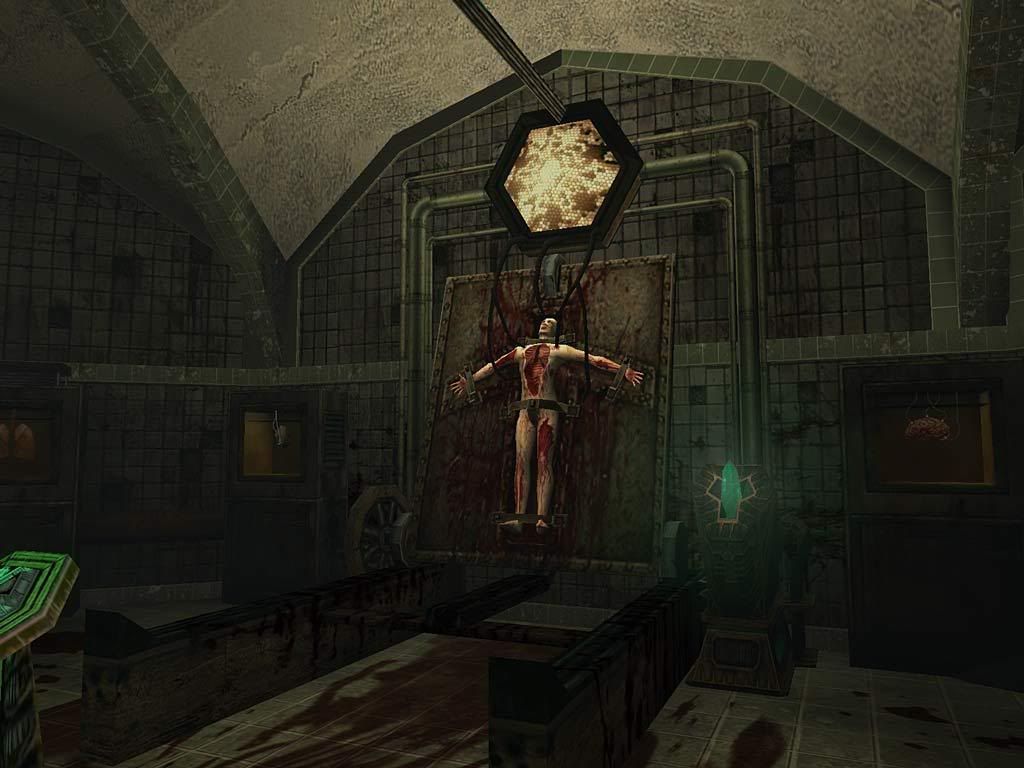
Gameplay mostly comprises unarmed escape and evasion, together with investigative exploration, although weapons and combat are introduced later on. As with most survival horror action/adventure games, ammunition is limited and must be conserved carefully for situations when it will really be indispensable, occasionally requiring the player to avoid combat even when armed. The game as a whole is linear, with only one path through the chapters from start to finish, in contrast with some earlier survival horror games such as the original Alone in the Dark (which is also based on the Mythos).
Levels
Prologue
A Visit to the Old Town
Attack of the Fishmen
Jailbreak
Escape from Innsmouth
The Marsh Refinery
The Esoteric Order of Dagon
A Dangerous Voyage
Devil's Reef
The Air-Filled Tunnels
Innsmouth
The mysterious, poverty-stricken town of Innsmouth lies like a decaying shipwreck on the edge of the Atlantic Ocean. To the casual observer it appears to be nothing more than a derelict coastal town plagued by recession, but closer inspection reveals that something much more sinister casting a dark shadow over Innsmouth.
Founded in 1643, Innsmouth grew steadily into a prosperous fishing port through trade with the West Indies. However, the town's history has been plagued with calamity and now the image of its former past has almost wasted away. The town itself is a half deserted, crumbling assortment of dilapidated buildings, narrow shabby streets, and cracked, cobbled pavements. The town is separated into two different areas by the Manuxet River, which runs through the middle of the town to the old harbor -- the main focal point. From here, an unmistakable fishy stench constantly emanates, adding to the unpleasantness of the surroundings.
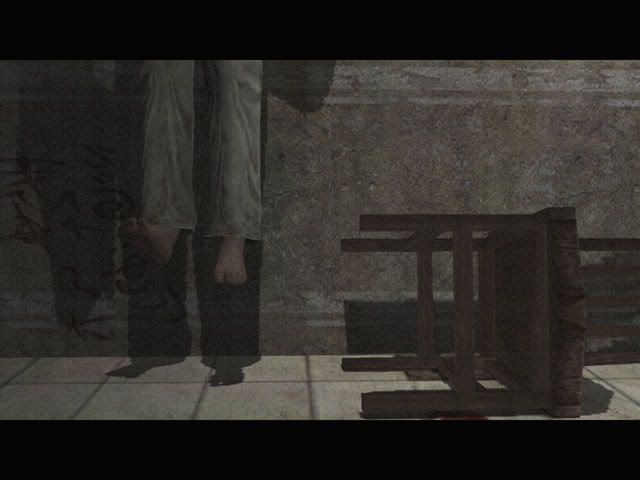
The area around Innsmouth consists mainly of vast uninhabitable marshlands and steep hills, isolating the town from outside influences. It is partly this seclusion that has stunted the town's growth; meaning modern amenities such as electricity, gas, and automobiles are not available to many of its inhabitants.
Little is known of Innsmouth's past, or what caused it to fall into such economical decline. Back in the 1820's there was a sudden unprecedented increase in the town's affluence through the export of gold from a newly established refinery. Rumors as to source of the gold indicate it originated from dealings with natives from an island south of the Pacific Ocean. However, this period of wealth seemed to lead to a much darker stage in the town's history, during which is was struck by a plague seemingly brought by one of the trade ships. Soon afterwards it is believed that a new religious cult became the prominent source of control in Innsmouth, ruling with a rod of iron and striking fear into the town's inhabitants.
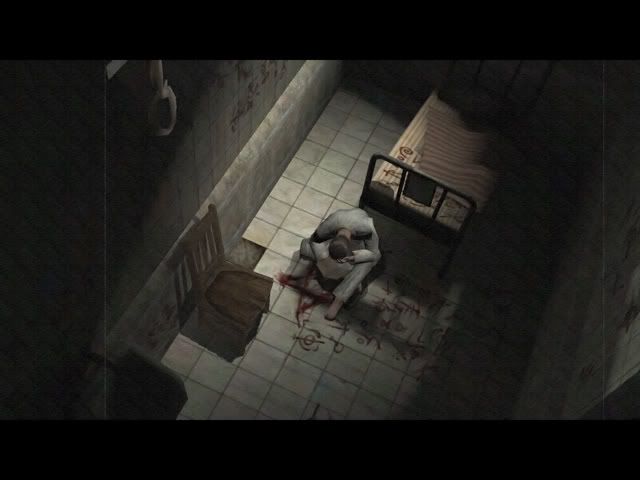
Since then, the town has become a foreboding place, desolate and unwelcoming to visitors. The few residents seen outside their homes appear to be cursed with some peculiar condition described in various stories as "The Innsmouth Look." There are unsavory rumors of inbreeding or a resurgence of the former plague, but there is no mistaking that there is something abnormal about the people of Innsmouth. They shuffle about clumsily with an arched posture, their eyes appearing large and unblinking, and their skin seems to exhibit a curious appearance -- a repulsive, pale-greenish scaly taint.
The people are notoriously inhospitable to outsiders, either ignoring them or questioning them aggressively. This attitude -- in combination with its dark past and disturbing atmosphere -- has resulted in Innsmouth having very few visitors. If anyone does come to stay, they very rarely stop overnight.
Other Locations
Strange House
A decrepit manor house located in Boston, Massachusetts first visited on September 6th, 1915. The manor was inhabited by a cult called the Fellowship of the Yith which numbered about 20, and was led by one Victor Holt. While a mess on its own, the areas directly underneath were revealed to bear a morgue, related medical facilities, and incredibly enough, functioning Yithian technology. On the same night Mr. Walters is sent to investigate Victor Holt's constant screaming and insane actions, the house is assaulted by police forces and the barrier is entered by Jack. It is on this same night that something so twisted and so very disturbing occurs to Jack that he is driven insane and is committed to the Arkham Asylum.
Arkham Asylum
The infamous psychiatric hospital from the Mythos. First visited after the aforementioned manor investigation, owing to a significant and sudden change in the protagonist's personality and mental features. A notable number of surreal flashback sequences involving the Sanitarium are experienced throughout the game, and a few actual revisits take place.
Marsh Refinery
A gold refinery owned by the Marsh family in Innsmouth, which was watched carefully as its high gold bar output did not match up with its low ore input. The refinery was raided by the FBI on February 8th, which uncovered a Cthulhu shrine and evidence of efforts to sell a deadly contagion to enemies of the state. Subsequently demolished with explosives.
Esoteric Order of Dagon
The entire town came under a combined land-and-sea siege on the 9th following the refinery raid. The only thing that proved problematic was the main Order building, which was spared from heavy weapons due to the wanted arrest of a man still inside, and showed itself to be nigh-impossible to breach by US Marines.
Urania
A United States Coast Guard cutter with modest armament, visited on the 10th. Aiding the raid effort, the ship was part of a group heading to Devil's Reef, following up on a lead provided by the FBI. Unfortunately, its close proximity to the Reef brought it the unwanted attention of the Deep Ones and Father Dagon himself, which resulted in the eventual sinking of the ship and possibly the loss of all hands. In the early stages of the battle, the Deep Ones boarded the vessel and began to raid it, killing all on deck. Dark wizards cast spells on the sea to create rogue waves, which caused all hands on deck at the time to be lost to the sea. With the damage done by Father Dagon, the vessel slipped beneath the waves, yielding only Mr. Walters alive. Most went down with the ship or were taken by the Deep Ones. Later, we find that at least one sailor survived only to be killed by an unseen monster.
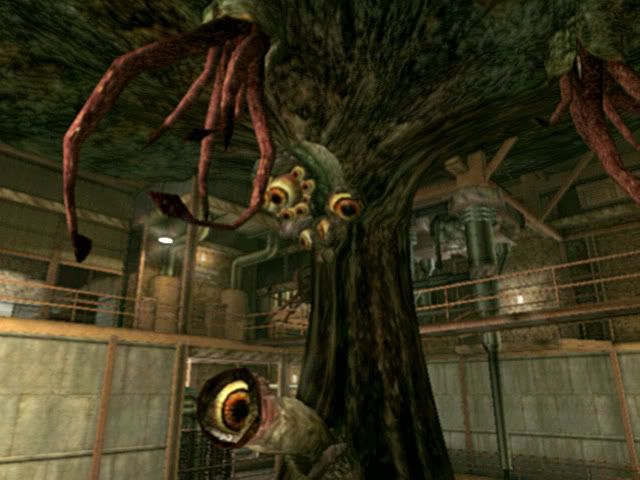
Devil's Reef
A tumultuous and unsafe reef that lies about half a mile from Innsmouth harbour, just off the coast of Massachusetts. While authorities know that Devil's Reef has old smuggling tunnels that lead all the way beneath the seabed, only a few know that the area is also home to a great underwater city.
Y'ha-nthlei
A large underwater city located a significant distance below Devil's Reef, well out of the sight of most people. A USN submarine part of the raid initially had difficulty in trying to torpedo it, due to the presence of a protective magic barrier that was being maintained by Mother Hydra. In fact, Jack learns on board the Urania that the submarine sank.
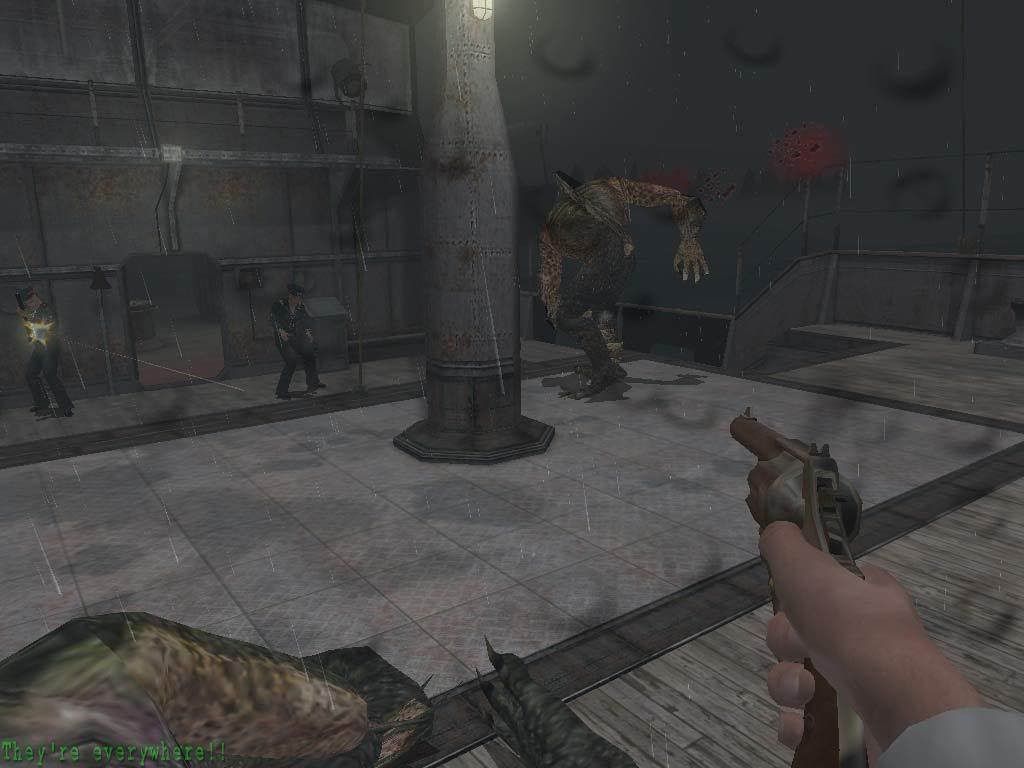
Pnakotus
The great library city of the Yith. Only seen formally if one gets the highest-ranking possible at the end of the story, although parts of it are seen in earlier, intermittent sequences. Even then, the formal viewing is brief as it starts just a few moments before a Flying polyp assault. However, the true vision is revealed when having an A rating, indicating that the Librarian Yith also swapped minds with Jack Walter's father in the past, and just when his father was about to go back in time, The Librarian Yith had used his body to impregnate Jack's mother shortly before swapping back. In flesh, Jack Walters is human, but in mind, his father is a Yithian, and that was the source of his psychic powers.
Weapons
Activating the secondary function on most ranged weapons will switch them to aimed mode, which allows for better accuracy. The game is unusual in that it does not have an artificial on-screen targeting reticle - instead, the player must more realistically use the iron sights on the weapon models themselves.
Crowbar
The first of two mêlée weapons available in the game. Rather underwhelming and only really useful for situations where one wishes to conserve ammunition, such as against a helpless target.
Stag Knife
A fixed-blade, clip-point stag knife. There is dried blood on it, and can be used to perform a quick one-handed strike or two-handed stabbing thrust. The thrust attack will quickly and silently drop an enemy if he is unaware of the protagonist.
Colt M1911
The well-known semi-automatic self-loading pistol designed by John Browning. It fires the proven .45 ACP cartridge, and a few shots into the torso will take care of most targets. Has simple, low recoil enabling the protagonist to fire approximately 4 rounds in the quick succession of one second.
Smith & Wesson Model 1917 Police revolver
A double action revolver that fires the .45 Long Colt cartridge. The weapon has high recoil, and firepower slightly higher than the M1911A1.
12 Gauge elephant gun
A break-action shotgun that chambers two 12-gauge buckshot shells side-by-side. Effectiveness decreases considerably with distance, and it is among the first weapons the player will get in the game.
Springfield 1903 rifle
A bolt-action rifle that loads .30-06 Springfield rounds from a stripper clip. It is the most damaging ranged weapon on a per-shot basis, but the act of cycling the action after every shot makes it less than suitable for close-range engagements, and the very slow reload makes it a risky choice when engaging multiple enemies.
Thompson Machine Gun
The infamous fully automatic Tommy-gun, fed from a 50-round drum magazine carrying .45 ACP in an ammunition pool separate from the M1911's. The weapon's high rate of fire, large capacity magazine and hard-hitting power make it unmatched for handling multiple enemies, but its tendency to jump about makes it very difficult to aim during sustained firing or over long ranges.
Energy weapon
A powerful Yithian directed-energy weapon that can be fired in quick taps or charged for more power, but too much charging causes a shut down. The white energy beam produces fantastic electrical effects, especially when used on water. The weapon has no sights, but the energy bolts it fires can be used much like tracer ammunition to "walk" the gun onto the target. Has unlimited ammunition but there is a delay between shots. This may correspond to the "curious weapons of molecular and atomic disturbances" wielded by the Elder Things in the Lovecraft's "At the Mountains of Madness."

As a preface for reading This post, please have this playing in the background.

Published by: Bethesda Softworks / 2K Games
Developed by: Headfirst Productions
Genre: First-Person Adventure
Number of Players: 1
Release Date:
US: October 24, 2005
MSRP: $39.99
ESRB Content Descriptors: Blood and Gore, Intense Violence, Strong Language, Use of Drugs and Alcohol
Also Available On: PC

Introduction
Call of Cthulhu -- Dark Corners of the Earth is a first-person horror game that combines intense action and adventure elements. You will draw upon your skills in exploration, investigation, and combat while faced with the seemingly impossible task of battling evil incarnate.
Other than fighting, you have the ability to interact freely with characters and the gaming environment. To increase the sense of immersion, there is no interface or 'HUD' on screen at any time during normal gameplay. Instead, more intuitive methods are available for you to assess your condition, ammunition levels, and other relevant information. The combat within the game is extremely realistic, with a detailed damage and healing system that breaks down the healing process into conditions and treatments - rather than having the typical FPS 'health packs' lying around everywhere.
The game also allows you to stamp your own style onto the proceedings via an advanced AI system that can react to your method of play. Cthulhu enemies can roam freely around the environment - opening doors and tracking you down single-handedly or in groups. To stay alive you won't just be able to outshoot them, you'll need to outthink them as well.
You will have to keep your mental health in check as you are exposed to the increasingly shocking images of the Cthulhu Mythos. You will need to combat enemies using the environment, powerful and evil artifacts, Alien technology, or by fighting with weapons that are completely authentic for the period.
Set during the 1920s, Call of Cthulhu is based on the Cthulhu Mythos of HP Lovecraft, an American writer of fantasy and horror. Lovecraft's stories tell of unthinkable evil, psychic possession, and mythical worlds and his work has profoundly influenced numerous fantasy and science fiction writers, including Stephen King and Anne Rice.
The technology powering Call of Cthulhu has provided Headfirst with the means to present an incredibly detailed and accurate depiction of the sights and sounds of this unique 1920's New England setting. A diverse range of cutting edge special effects is utilized to ensure both unprecedented levels of realism and an exact portrayal of your mental degredation.
Key Features:
Diverse array of levels from quaint towns to alien locations, including Deep One City
Dynamic Sanity system resulting in hallucinations, panic attacks, vertigo, paranoia, and more!
Incredibly detailed real-time graphics with atmospheric lighting and dynamic shadows
Intelligent gameplay involving puzzle solving as well as combat and exploration
1920s weaponry and vehicles as well as evil artifacts and alien technology
Lovecraft's famous monsters and locations
H.P. Lovecraft
Howard Phillips Lovecraft (August 20, 1890 March 15, 1937), of Providence, Rhode Island, was an American author of fantasy, horror and science fiction.
Lovecraft's major inspiration and invention was cosmic horror: life is incomprehensible to human minds and the universe is fundamentally alien. Those who genuinely "reason", like his protagonists, gamble with sanity. Lovecraft has become a cult figure for his Cthulhu Mythos, a series of loosely interconnected fictions featuring a pantheon of human-invalidating entities, as well as the famed Necronomicon, a grimoire of magical rites and forbidden lore. His works were deeply pessimistic; myths directly assaulting Enlightenment, Romanticism and Christianity.

H. P. Lovecrafts name is synonymous with horror fiction; his writing, particularly the Cthulhu Mythos, has influenced fiction authors worldwide, and Lovecraftian elements may be found in novels, movies, music, comic books and cartoons. For example, the insane villains of Gotham City in the Batman stories are said to be incarcerated at Arkham Asylum - Arkham being an invention of Lovecrafts. Many modern horror writers such as Stephen King, Bentley Little, Joe R. Lansdale, to name just a few have cited Lovecraft as one of their primary influences.
Lovecraft's fiction has been grouped into three categories by some critics. While Lovecraft did not refer to these categories himself, he did once write, "There are my 'Poe' pieces and my 'Dunsany pieces' but alas where are my Lovecraft pieces?"[5]
Macabre stories (approximately 19051920)
Dream Cycle stories (approximately 19201927)
Cthulhu Mythos/Lovecraft Mythos stories (approximately 19251935)
Some critics see little difference between the Dream Cycle and the Mythos, often pointing to the recurring Necronomicon and subsequent "gods". A frequently given explanation is that the Dream Cycle belongs more to the genre of fantasy, while the Mythos is science fiction. Also, much of the supernatural elements in the Dream Cycle takes place in its own sphere or mythological dimension separated from our own level of existence. The Mythos on the other hand, is placed within the same reality and cosmos as the humans live in.

Much of Lovecraft's work was directly inspired by his nightmares, and it is perhaps this direct insight into the unconscious and its symbolism that helps to account for their continuing resonance and popularity.
All these interests naturally led to his deep affection for the works of Edgar Allan Poe, who heavily influenced his earliest macabre stories and writing style known for its creepy atmosphere and lurking fears.
Cthulhu Mythos
The Cthulhu Mythos encompasses the shared elements, characters, settings, and themes found in the works of H. P. Lovecraft and associated horror fiction writers. Together, they form the mythos that authors writing in the Lovecraftian milieu have usedand continue to useto craft their stories. The term itself was coined by the writer August Derleth. Although this legendarium is also sometimes called the Lovecraft Mythos, most notably by the Lovecraft scholar S. T. Joshi it has long since moved beyond Lovecraft's original conception.
Robert M. Price, in his essay "H. P. Lovecraft and the Cthulhu Mythos", sees two stages in the development of the Cthulhu Mythos. The first stage, or "Cthulhu Mythos proper" as Price calls it, took shape during Lovecraft's lifetime and was subject to his guidance. The second stage occurred under August Derleth who attempted to categorize and expand the Mythos after Lovecraft's death.

The essence in the Mythos is that the human world and our role in it are an illusion. Humanity is simply living in a fragile bubble, unaware of what lies behind the curtains or even of the curtains themselves, and our seeming dominance over the world is illusory and ephemeral. We are blessed in that we do not realize what lies dormant in the unknown lurking places on Earth and beyond. As Lovecraft famously begins his short story, The Call of Cthulhu, "The most merciful thing in the world, I think, is the inability of the human mind to correlate all its contents."
Now and then, individuals can, by accident or carelessness, catch a glimpse of, or even confront the ancient extraterrestrial entities which the mythology centres around, usually with fatal consequences. Other times, they are represented by their non-human worshippers, whose existence shatters the worldview of those who stumble across them. Human followers exist as well. Because of the limitations of the human mind, these deities appear as so overwhelming that they can often drive a person insane. They are portrayed as neither good or evil; within the Mythos these are concepts invented by our species as a way to explain inexplicable intentions and actions.
The Call of Cthulhu was the premiere story in which Lovecraft realized and made full use of these themes, which is why his mythology would later be named after the creature in this story, as it defined a new direction in both his authorship and in the horror fiction genre. This is also the first and only story by Lovecraft where humans and one of the cosmic entities called the Great Old Ones comes face to face.
Most of the elements of Lovecraft's Mythos were not a cross-pollination of the various story-cycles of the Lovecraft Circle, but were instead deliberately created by each writer to become part of the Mythos the most notable example being the various arcane grimoires of forbidden lore. So, for example, Robert E. Howard has his character Friedrich Von Junzt reading Lovecraft's Necronomicon in "The Children of the Night" (1931), and Lovecraft in turn mentions Howard's Unaussprechlichen Kulten in both "Out of the Aeons" (1935) and "The Shadow Out of Time (1936). Howard frequently corresponded with H. P. Lovecraft, and the two would sometimes insert references or elements of each others' settings in their works. Later editors reworked many of the original Conan stories by Howard; thus, diluting this connection. Nevertheless, many of Howard's unedited Conan stories are arguably part of the Cthulhu Mythos.

The Mythos usually takes place in fictional New England towns and is centered on the Great Old Ones, a fearsome assortment of ancient, powerful deities who came from outer space and once ruled the Earth. They are presently quiescent, having fallen into a death-like sleep at some time in the distant past. The most well-known of these beings is Cthulhu, who currently lies "dead [but] dreaming" in the submerged city of R'lyeh somewhere in the Southeast Pacific Ocean. One day, "when the stars are right", R'lyeh will rise from beneath the sea, and Cthulhu will awaken and wreak havoc on the earth.
Despite his notoriety, Cthulhu is not the most powerful of the deities, nor is he the theological center of the mythos. Instead, this position is held by the demon-god Azathoth, an Outer God, ruling from his cosmically centered court. Nonetheless, Nyarlathotep, who fulfills Azathoth's random urges, has intervened more frequently and more directly in human affairs than any other Outer god. He has also displayed more blatant contempt for humanity, especially his own worshippers, than almost any other Lovecraftian deity.
Gameplay
The game is notable for featuring no HUD - instead of an overlaid health meter, the character's condition is relayed through the sound cues of his heartbeat and breathing, which become more pronounced when wounded.

The character loses sanity when he looks directly at upsetting aspects of the game world, such as mutilated bodies or precipitous drops. Sanity loss can lead to hallucinations and visions, which manifest as graphical anomalies, sound distortion and changes in control sensitivity. If the character is sufficiently disturbed, permanent insanity or suicide will result and the game will end. The game's health system is more realistic than other games of its genre, in that different forms of injury will require different remedies, such as a splint for a broken leg.

Gameplay mostly comprises unarmed escape and evasion, together with investigative exploration, although weapons and combat are introduced later on. As with most survival horror action/adventure games, ammunition is limited and must be conserved carefully for situations when it will really be indispensable, occasionally requiring the player to avoid combat even when armed. The game as a whole is linear, with only one path through the chapters from start to finish, in contrast with some earlier survival horror games such as the original Alone in the Dark (which is also based on the Mythos).
Levels
Prologue
A Visit to the Old Town
Attack of the Fishmen
Jailbreak
Escape from Innsmouth
The Marsh Refinery
The Esoteric Order of Dagon
A Dangerous Voyage
Devil's Reef
The Air-Filled Tunnels
Innsmouth
The mysterious, poverty-stricken town of Innsmouth lies like a decaying shipwreck on the edge of the Atlantic Ocean. To the casual observer it appears to be nothing more than a derelict coastal town plagued by recession, but closer inspection reveals that something much more sinister casting a dark shadow over Innsmouth.
Founded in 1643, Innsmouth grew steadily into a prosperous fishing port through trade with the West Indies. However, the town's history has been plagued with calamity and now the image of its former past has almost wasted away. The town itself is a half deserted, crumbling assortment of dilapidated buildings, narrow shabby streets, and cracked, cobbled pavements. The town is separated into two different areas by the Manuxet River, which runs through the middle of the town to the old harbor -- the main focal point. From here, an unmistakable fishy stench constantly emanates, adding to the unpleasantness of the surroundings.

The area around Innsmouth consists mainly of vast uninhabitable marshlands and steep hills, isolating the town from outside influences. It is partly this seclusion that has stunted the town's growth; meaning modern amenities such as electricity, gas, and automobiles are not available to many of its inhabitants.
Little is known of Innsmouth's past, or what caused it to fall into such economical decline. Back in the 1820's there was a sudden unprecedented increase in the town's affluence through the export of gold from a newly established refinery. Rumors as to source of the gold indicate it originated from dealings with natives from an island south of the Pacific Ocean. However, this period of wealth seemed to lead to a much darker stage in the town's history, during which is was struck by a plague seemingly brought by one of the trade ships. Soon afterwards it is believed that a new religious cult became the prominent source of control in Innsmouth, ruling with a rod of iron and striking fear into the town's inhabitants.

Since then, the town has become a foreboding place, desolate and unwelcoming to visitors. The few residents seen outside their homes appear to be cursed with some peculiar condition described in various stories as "The Innsmouth Look." There are unsavory rumors of inbreeding or a resurgence of the former plague, but there is no mistaking that there is something abnormal about the people of Innsmouth. They shuffle about clumsily with an arched posture, their eyes appearing large and unblinking, and their skin seems to exhibit a curious appearance -- a repulsive, pale-greenish scaly taint.
The people are notoriously inhospitable to outsiders, either ignoring them or questioning them aggressively. This attitude -- in combination with its dark past and disturbing atmosphere -- has resulted in Innsmouth having very few visitors. If anyone does come to stay, they very rarely stop overnight.
Other Locations
Strange House
A decrepit manor house located in Boston, Massachusetts first visited on September 6th, 1915. The manor was inhabited by a cult called the Fellowship of the Yith which numbered about 20, and was led by one Victor Holt. While a mess on its own, the areas directly underneath were revealed to bear a morgue, related medical facilities, and incredibly enough, functioning Yithian technology. On the same night Mr. Walters is sent to investigate Victor Holt's constant screaming and insane actions, the house is assaulted by police forces and the barrier is entered by Jack. It is on this same night that something so twisted and so very disturbing occurs to Jack that he is driven insane and is committed to the Arkham Asylum.
Arkham Asylum
The infamous psychiatric hospital from the Mythos. First visited after the aforementioned manor investigation, owing to a significant and sudden change in the protagonist's personality and mental features. A notable number of surreal flashback sequences involving the Sanitarium are experienced throughout the game, and a few actual revisits take place.
Marsh Refinery
A gold refinery owned by the Marsh family in Innsmouth, which was watched carefully as its high gold bar output did not match up with its low ore input. The refinery was raided by the FBI on February 8th, which uncovered a Cthulhu shrine and evidence of efforts to sell a deadly contagion to enemies of the state. Subsequently demolished with explosives.
Esoteric Order of Dagon
The entire town came under a combined land-and-sea siege on the 9th following the refinery raid. The only thing that proved problematic was the main Order building, which was spared from heavy weapons due to the wanted arrest of a man still inside, and showed itself to be nigh-impossible to breach by US Marines.
Urania
A United States Coast Guard cutter with modest armament, visited on the 10th. Aiding the raid effort, the ship was part of a group heading to Devil's Reef, following up on a lead provided by the FBI. Unfortunately, its close proximity to the Reef brought it the unwanted attention of the Deep Ones and Father Dagon himself, which resulted in the eventual sinking of the ship and possibly the loss of all hands. In the early stages of the battle, the Deep Ones boarded the vessel and began to raid it, killing all on deck. Dark wizards cast spells on the sea to create rogue waves, which caused all hands on deck at the time to be lost to the sea. With the damage done by Father Dagon, the vessel slipped beneath the waves, yielding only Mr. Walters alive. Most went down with the ship or were taken by the Deep Ones. Later, we find that at least one sailor survived only to be killed by an unseen monster.

Devil's Reef
A tumultuous and unsafe reef that lies about half a mile from Innsmouth harbour, just off the coast of Massachusetts. While authorities know that Devil's Reef has old smuggling tunnels that lead all the way beneath the seabed, only a few know that the area is also home to a great underwater city.
Y'ha-nthlei
A large underwater city located a significant distance below Devil's Reef, well out of the sight of most people. A USN submarine part of the raid initially had difficulty in trying to torpedo it, due to the presence of a protective magic barrier that was being maintained by Mother Hydra. In fact, Jack learns on board the Urania that the submarine sank.

Pnakotus
The great library city of the Yith. Only seen formally if one gets the highest-ranking possible at the end of the story, although parts of it are seen in earlier, intermittent sequences. Even then, the formal viewing is brief as it starts just a few moments before a Flying polyp assault. However, the true vision is revealed when having an A rating, indicating that the Librarian Yith also swapped minds with Jack Walter's father in the past, and just when his father was about to go back in time, The Librarian Yith had used his body to impregnate Jack's mother shortly before swapping back. In flesh, Jack Walters is human, but in mind, his father is a Yithian, and that was the source of his psychic powers.
Weapons
Activating the secondary function on most ranged weapons will switch them to aimed mode, which allows for better accuracy. The game is unusual in that it does not have an artificial on-screen targeting reticle - instead, the player must more realistically use the iron sights on the weapon models themselves.
Crowbar
The first of two mêlée weapons available in the game. Rather underwhelming and only really useful for situations where one wishes to conserve ammunition, such as against a helpless target.
Stag Knife
A fixed-blade, clip-point stag knife. There is dried blood on it, and can be used to perform a quick one-handed strike or two-handed stabbing thrust. The thrust attack will quickly and silently drop an enemy if he is unaware of the protagonist.
Colt M1911
The well-known semi-automatic self-loading pistol designed by John Browning. It fires the proven .45 ACP cartridge, and a few shots into the torso will take care of most targets. Has simple, low recoil enabling the protagonist to fire approximately 4 rounds in the quick succession of one second.
Smith & Wesson Model 1917 Police revolver
A double action revolver that fires the .45 Long Colt cartridge. The weapon has high recoil, and firepower slightly higher than the M1911A1.
12 Gauge elephant gun
A break-action shotgun that chambers two 12-gauge buckshot shells side-by-side. Effectiveness decreases considerably with distance, and it is among the first weapons the player will get in the game.
Springfield 1903 rifle
A bolt-action rifle that loads .30-06 Springfield rounds from a stripper clip. It is the most damaging ranged weapon on a per-shot basis, but the act of cycling the action after every shot makes it less than suitable for close-range engagements, and the very slow reload makes it a risky choice when engaging multiple enemies.
Thompson Machine Gun
The infamous fully automatic Tommy-gun, fed from a 50-round drum magazine carrying .45 ACP in an ammunition pool separate from the M1911's. The weapon's high rate of fire, large capacity magazine and hard-hitting power make it unmatched for handling multiple enemies, but its tendency to jump about makes it very difficult to aim during sustained firing or over long ranges.
Energy weapon
A powerful Yithian directed-energy weapon that can be fired in quick taps or charged for more power, but too much charging causes a shut down. The white energy beam produces fantastic electrical effects, especially when used on water. The weapon has no sights, but the energy bolts it fires can be used much like tracer ammunition to "walk" the gun onto the target. Has unlimited ammunition but there is a delay between shots. This may correspond to the "curious weapons of molecular and atomic disturbances" wielded by the Elder Things in the Lovecraft's "At the Mountains of Madness."

